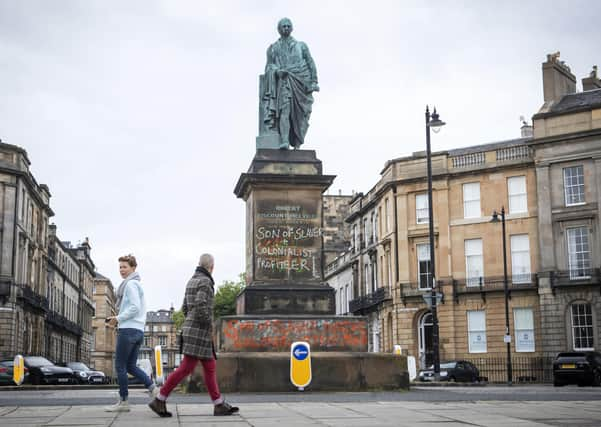Henry Dundas: Descendant of Viscount Melville likens ancestor to Nicola Sturgeon


Police said yesterday that officers will carry out extra patrols around several Scottish monuments this weekend to try to stop them being vandalised as part of the Black Lives Matter protests.
The statues include those of Henry Dundas in Edinburgh’s St Andrew Square and his son Robert, the 2nd Viscount Melville, in the city’s Melville Street.
Advertisement
Hide AdAdvertisement
Hide AdThe worldwide protests were sparked by the death of George Floyd in US police custody after an officer refused to lift his knee from his neck, despite Mr Floyd pleading that he could not breathe.
Henry Dundas is blamed for delaying the abolition of slavery by 15 years as he introduced an amendment to William Wilberforce’s 1792 bill that brought about a gradual rather than an immediate end to Britain’s role in the slave trade.
Writing in The Scotsman today, Althea Dundas-Bekker, of Gorebridge, Midlothian, defends her ancestor as “a man of great courage”.
She writes: “Like our First Minister today, he was having to make difficult decisions in dangerous times: for Nicola Sturgeon the pandemic, for Henry Dundas the French Revolution and the effect it would have on Britain.
“He had his faults, but most troubling to his descendants is the inference that he deliberately, to pander to the moneyed, delayed the abolishing of the slavery of our fellow man.Respected historians have explained to me he was waiting until the time was right.”
Yesterday wording was agreed by city leaders for a plaque to be placed on the monument, which reads: “Dundas was a contentious figure, provoking controversies that resonate to this day.
“While Home Secretary in 1792 and first Secretary of State for War in 1796 he was instrumental in deferring the abolition of the Atlantic slave trade. Slave trading by British ships was not abolished until 1807. As a result of this delay, more than half a million enslaved Africans crossed the Atlantic. Dundas also curbed democratic dissent in Scotland.
“Dundas both defended and expanded the British empire, imposing colonial rule on indigenous peoples. He was impeached in the United Kingdom for misappropriation of public money and although acquitted, he never held public office again. Despite this, the monument before you to Henry Dundas was funded by voluntary contribution from officers, petty officers, seamen and marines and erected in 1821, with the statue placed on top in 1827. In 2020 this was dedicated to the memory of the more than half a million Africans whose enslavement was a consequence of Henry Dundas’s actions.”
Advertisement
Hide AdAdvertisement
Hide AdMs Dundas-Bekker said the wording sounded “fairish” and pointed out that the statue and column was erected 25 years after her ancestor’s death and was funded by public subscription.
She said Henry Dundas provided legal defence for Joseph Knight, a slave brought to Perthshire from Jamaica by a Scottish landowner who claimed ownership of him. Mr Knight secured his freedom only after Scottish courts ruled Jamiacan laws could not apply in Scotland, effectively abolishing slavery in this country.
On the prospect of further protests, Police Scotland Assistant Chief Constable Kenny MacDonald said officers will be carrying out additional patrols around the statues over the weekend.
Mr MacDonald said: “Our firm advice remains that people should find alternative ways to protest rather than attending mass gatherings – for example, through digital means.
“I am aware that vandalism of a small number of monuments and statues has taken place in recent days.
“Such action is criminal and will be fully investigated. Police officers will be providing additional patrolling around such monuments and statues in the coming days to deter such criminality.”
Meanwhile the UK government faces possible legal action over exports of riot control equipment to US authorities amid concerns about police brutality. Lawyers have sent a pre-action protocol letter, the first step in a potential High Court challenge, to International Trade Secretary Liz Truss in a bid to stop sales of equipment including CS gas, tear gas and rubber bullets.